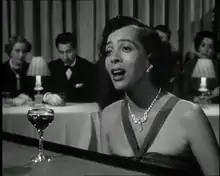Hadda Brooks
Hadda Brooks (October 29, 1916 – November 21, 2002) was an American pianist, vocalist and composer, who was billed as "Queen of the Boogie".[1] She was Inducted in the Rhythm and Blues Foundation Hall of Fame in 1993.[2]
Hadda Brooks | |
|---|---|
 Brooks as the singer of "I Hadn't Anyone Till You" in the film In a Lonely Place (1950) | |
| Background information | |
| Birth name | Hattie L. Hapgood |
| Born | October 29, 1916 Los Angeles, California, U.S. |
| Died | November 21, 2002 (aged 86) Los Angeles, California, U.S. |
| Genres | Blues, boogie woogie, jazz, R&B |
| Occupation(s) | Musician, composer |
| Instrument(s) | Piano, vocals |
| Years active | 1940s–2000s |
| Labels | Modern, Crown, Virgin, Point Blank, Oldie Blues |
Career
Her first recording, "Swingin' the Boogie", for Modern Records, was a regional hit in 1945. Another R&B Top Ten hit, "Out of the Blue," was her most famous song.[3][4] Brooks preferred ballads to boogie-woogie, but developed the latter style by listening to Albert Ammons, Pete Johnson, and Meade Lux Lewis records.
In the 1970s, she commuted to Europe for performances in nightclubs and festivals. She performed rarely in the United States, living for many years in Australia. Queen of the Boogie, a compilation of recordings from the 1940s, was released in 1984. Two years later her manager Alan Eichler brought her out of a 16-year retirement to open a jazz room at Perino's in Los Angeles, after which she continued to perform in nightclubs in Hollywood, San Francisco, and New York City.[5] She sang at Hawaii's statehood ceremony in 1959 and was asked for a private audience by Pope Pius XII.[6]
She resumed her recording career with the 1994 album Anytime, Anyplace, Anywhere for DRG. Virgin Records acquired the old Modern catalogue and, thanks to Brooks' new-found success, issued a compilation of her 1940s and 1950s recordings entitled That's My Desire. The label signed her to record three songs for the Christmas album Even Santa Gets the Blues, made more unusual by the fact she had releases on the same label 50 years apart. Time Was When (Virgin, 1996) included Al Viola (guitar), Eugene Wright (bass) and Richard Dodd (cello), and she wrote two of its songs: "You Go Your Way and I'll Go Crazy" and "Mama's Blues". She began playing at Johnny Depp's Viper Room, the Algonquin Hotel's Oak Room, and Michael's Pub in New York City, and such Hollywood clubs as Goldfinger's, the Vine St. Bar and Grill, and the Hollywood Roosevelt Cinegrill. She celebrated her 80th birthday in 1996 by performing two full shows at Depp's Viper Room.[7]
In 2007, a 72-minute documentary on Brooks's life, Queen of the Boogie, directed by Austin Young and Barry Pett, was presented at the Los Angeles Silver Lake Film Festival.[8]
Personal
Jules Bihari gave her the recording name "Hadda Brooks".[9]
In 1940, Brooks married Earl "Shug" Morrison, of the Harlem Globetrotters, but was widowed within a year, and she never married again.[10]
Brooks died at the age of 86 at White Memorial Medical Center in Los Angeles after open-heart surgery.[11]
Discography
| Year | Title | Genre | Label |
|---|---|---|---|
| 1956 | Femme Fatale | Jazz, blues | Crown |
| 1958 | Boogie | Jazz, blues | Crown |
| 1963 | Sings & Swings | Jazz, blues | Crown |
| 1984 | Queen of the Boogie | Jazz, blues | Oldie Blues |
| 1994 | Anytime, Anyplace, Anywhere | Jazz, blues | DRG |
| 1995 | That's My Desire (released as Romance in the Dark in the UK) | Jazz, blues | Virgin (Ace-UK) |
| 1995 | Even Santa Gets the Blues | Jazz, blues | Virgin |
| 1996 | Time Was When | Jazz, blues | Virgin |
| 1999 | I've Got News for You | Jazz, blues | Virgin |
Filmography
| Year | Title | Role | Notes |
|---|---|---|---|
| 1947 | Out of the Blue | Herself | |
| 1948 | Boogie Woogie Blues | Herself | |
| 1949 | The Joint is Jumpin' | Herself | |
| 1950 | In a Lonely Place | Herself | |
| 1952 | The Bad and the Beautiful | Piano Player | Uncredited |
| 1995 | The Crossing Guard | Piano Player | |
| 1999 | The Thirteenth Floor | Lounge Piano Player | |
| 2000 | John John in the Sky | Mrs. Kendricks | (final film role) |
References
- Larkin, Colin. The Guinness Encyclopedia of Popular Music, Guinness Limited, page 563, (1995); ISBN 1-56159-176-9
- "Obituary: Hadda Brooks". the Guardian. February 4, 2003. Retrieved July 18, 2022.
- Vladimir, Bogdanov. All Music Guide to the Blues: The Definitive Guide to the Blues, Backbeat Books, page 68 (2003); ISBN 0-87930-736-6
- Mchie, Benjamin. "Hadda Brooks, Pianist, and Singer born". African American Registry. Retrieved July 18, 2022.
- Watrous, Peter (July 26, 1989). "With Boogie-Woogie, Hadda Brooks Is Back". The New York Times.
- Hadda Brooks, the 'Queen of Boogie' dies, sfgate.com; accessed November 9, 2014.
- E-notes: Hadda Brooks Biography; accessed November 9, 2014.
- "Queen of the Boogie" Archived July 24, 2011, at the Wayback Machine, audience.silverlakefilmfestival.org; accessed November 9, 2014.
- Cohassey, John F. Toast of the Town: The Life and Times of Sunnie Wilson, Wayne State University Press, page 156, (1998); ISBN 0-8143-2696-X
- "Obituary: Hadda Brooks". the Guardian. February 4, 2003. Retrieved July 18, 2022.
- Morris, Chris (November 26, 2002). "Billboard Bits: Cher, El Mocambo, Hadda Brooks". Billboard. Retrieved July 19, 2018.
External links
- Interview of Hadda Brooks Center for Oral History Research, UCLA Library Special Collections, University of California, Los Angeles